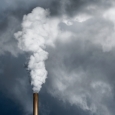Energy Policy Conservation Act (CAFE standards)
The “Energy Policy Conservation Act,” enacted into law by Congress in 1975, added Title V, “Improving Automotive Efficiency,” to the Motor Vehicle Information and Cost Savings Act and established CAFE standards for passenger cars and light trucks. The Act was passed in response to the 1973-74 oil embargo. The near-term goal was to double new car fuel economy by model year 1985.
“Corporate Average Fuel Economy (CAFE) is the sales weighted average fuel economy, expressed in miles per gallon (mpg), of a manufacturer’s fleet of passenger cars or light trucks with a gross vehicle weight rating (GVWR) of 8,500 lbs. or less, manufactured for sale in the United States, for any given model year. Fuel economy is defined as the average mileage traveled by an automobile per gallon of gasoline (or equivalent amount of other fuel) consumed as measured in accordance with the testing and evaluation protocol set by the Environmental Protection Agency".
Commentary
Cry Wolf Quotes
If the CAFE standard is too high, it adversely affects workers, manufacturers, and consumers alike.
We’re certainly not, and I don’t think congress should be, in the business of mandating consumer choice. If you do the math on it, the consumer will never pay for it. We obviously don’t think the CAFE standards are very well thought out.
If we sell too many big cars, we’ll have to stop building them. Then we’ll have to ram small cars down consumers’ throats and use dealer incentives to get rid of them so that we can build big cars again. The public is going to rebel because these hard-to-get big cars will then sell for full list or higher when the small cars are being given away.
With the Environmental Protection Agency laws, we’d either have to shut down or break the law, and we aren’t going to break the law.
Evidence
-
Blind Spot: The Big Three's Attack on the Global Warming Treaty
eleased during the controversy over the Kyoto Treaty, this study is a serious policy paper, exploring the intersections between transit policy and global warming. It fairly establishes the Big Three have as long history of stubborn obstructionism. (They don't like anyone telling them what to do.)
-
CAFE Standards Not an Undue Burden on Domestic Manufacturers
CAFE standards clearly contributed to increased fuel economy and didn't unduly burden the domestic manufacturers.
-
Experts Claim the National Highway Safety Administration (NHTSA) Saves Lives and Money
Safety experts make the case for the National Highway Safety Administration (NHTSA).
Backgrounders & Briefs
The Success of CAFE Standards
How the CAFE standard and its successes.


